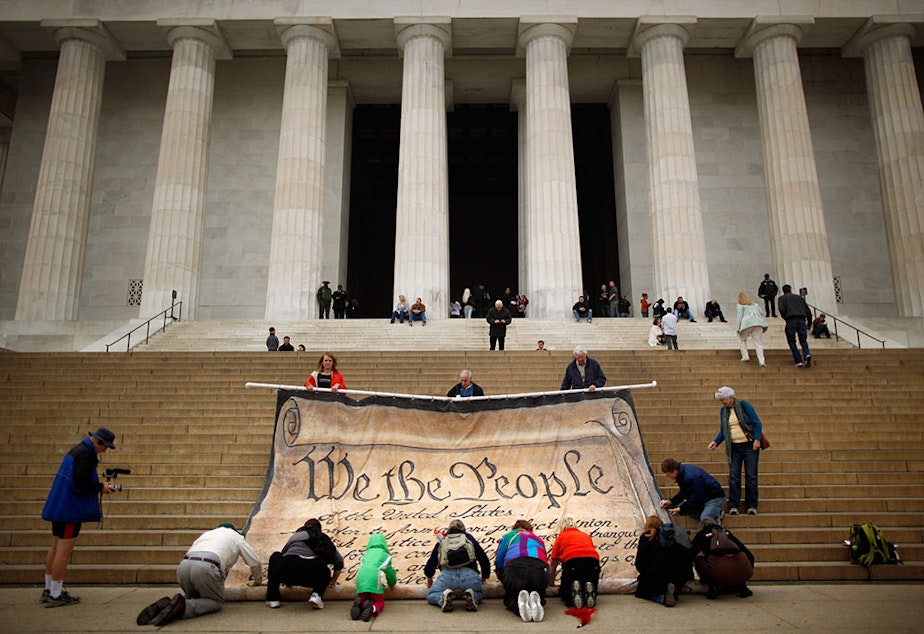Taking Stock Of The Supreme Court's Citizens United Decision, 10 Years Later

It’s been 10 years since the Supreme Court’s landmark decision on Citizens United. We’ll look back at the last decade and take stock of the fallout.
Guests
Carrie Levine, senior reporter at the Center for Public Integrity. (@levinecarrie)
Bradley Smith, professor of law at Capital University Law School. (@CommishSmith)
Rick Hasen, professor of law and political science at the University of California, Irvine. (@rickhasen)
Sponsored
John S. Adams, editor-in-chief of the Montana Free Press. (@johnsadams406)
From The Reading List
Slate: “The Decade of Citizens United” — “In 2010, the largest reported individual contributors to federal campaigns in American politics were Robert and Doylene Perry, owners of Perry Homes, who donated about $7.5 million to support Republican and conservative candidates. In 2018, the largest reported contributors were casino magnate Sheldon Adelson and his wife, Miriam, who contributed about $122 million in outside money to support such candidates, representing a 16-fold increase over the Perrys’ 2010 contributions, according to data collected by the Center for Responsive Politics.
“What explains this dramatic shift in American elections, where the wealthiest Americans get to have even greater influence over who is elected and what policies elected officials pursue? The Supreme Court’s 2010 opinion, Citizens United v. Federal Election Commission.
“In 2010, Citizens United held that corporations have a First Amendment right to spend sums independently to support or oppose candidates for office. Looking at the amount of direct corporate spending in elections over the past decade, one might think that Citizens United was a bust. Few for-profit corporations spend money in their own names boosting or dissing candidates. But this case helped to usher in a sea change in American elections, and its influence on the decade that followed is hard to overstate.”
Sponsored
Wall Street Journal: “Commentary: Celebrate the Citizens United Decade” — “‘Last week,” President Obama declared a decade ago, “the Supreme Court reversed a century of law that I believe will open the floodgates for special interests—including foreign corporations—to spend without limit in our elections.
“Mr. Obama was wrong in almost every respect about Citizens United v. Federal Election Commission, which the court decided on Jan. 21, 2010. Hysterical predictions about Citizens United—then-Rep. Ed Markey, among others, compared it to Dred Scott—haven’t held up.
“Contrary to Mr. Obama’s assertion about a century of law, Citizens United overturned portions of McCain-Feingold, a campaign-finance law that wasn’t even 10 years old, and another law from 1947. Those laws prohibited unions and corporations, including nonprofits, from voicing support for or opposition to candidates for federal office.”
The Hill: “Citizens United decision weathers 10 years of controversy” — “A decade after the Supreme Court’s landmark Citizens United decision, which ushered in the era of super PACs and unlimited donations, the fight over the contentious ruling shows no signs of easing.
“The case upended the campaign finance system, after the justices in a 5-4 ruling authored by Justice Anthony Kennedy on Jan. 21, 2010 found that restrictions on corporate campaign spending violated free speech.
Sponsored
“Democrats blasted the decision, warning of the impact of corporate money flooding into elections. But the ruling also opened the door for labor unions and nonprofits to ramp up their campaign spending, altering the landscape.”
Washington Post: “Opinion: The legacy of ‘Citizens United’ has been destructive. We need campaign finance reform” — “Jan. 21 marks the 10th anniversary of the disastrous Citizens United decision, the most consequential — and destructive — campaign finance decision by the Supreme Court in nearly half a century. The legacy of Citizens United has been even more damaging than almost anyone understood when the ruling came down.
“The decision helped return the most dangerous and corrupting money to our elections. It provided the wealthiest Americans with a predominant role in campaign financing by giving birth to super PACs permitted to collect multimillion-dollar checks. It allowed hundreds of millions of dollars in large, secret contributions to be spent to influence federal elections through the use of undisclosed “dark money” given to nonprofits.
“In short, the destructive impact of Citizens United on our political system has made the Watergate campaign finance scandals, the worst of the last century, look like child’s play.”
This article was originally published on WBUR.org. [Copyright 2020 NPR]
